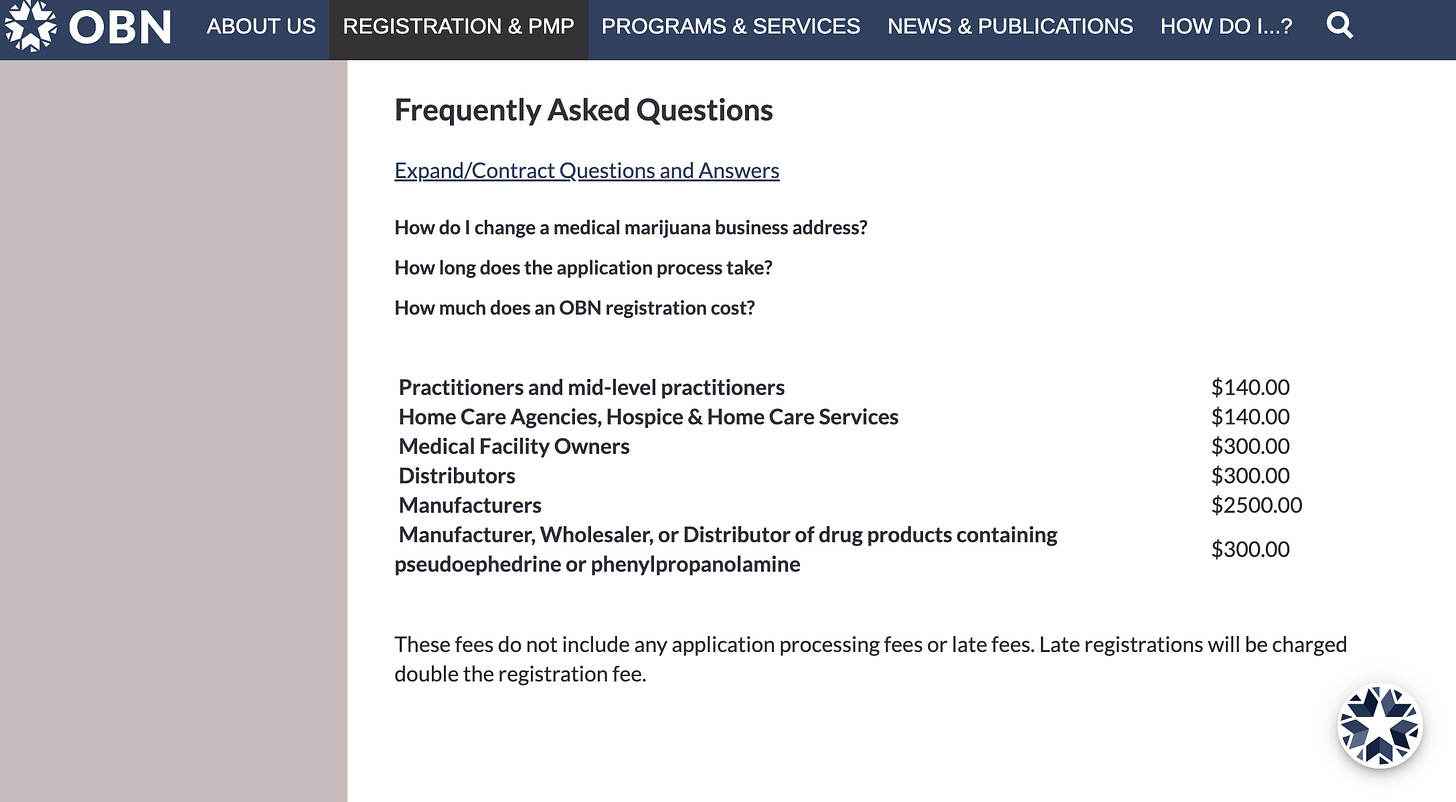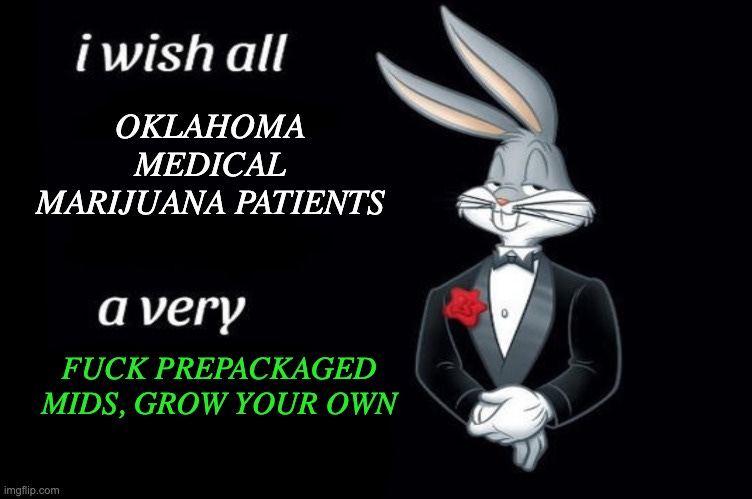The Legislative Session is Almost Over. Time For a Check-up.
Oklahoma's Medical Cannabis program will go through even more changes, again. At the federal level, there was also news.
The Oklahoma Regular Legislative Session is nearing its end and some medical cannabis bills have already been approved by Governor Stitt, creating new rules for OMMA to promulgate soon and new adjustments for businesses and patients who will ultimately be affected by them. While the session is ongoing, if a bill hits the Governors desk it is still able to become law without his signature after five days, if it is not vetoed. For a quick reference, past medical cannabis bills Stitt has vetoed include SB437(2023), and HB3228(2020), which would have allowed cannabis delivery to patients in a nearby radius at the onset of the covid outbreak.
Bills Signed by Stitt Already
The following bills are some that have been signed already and take effect either right away due to emergency provisions or, will go into effect in late 2024 or next year, based on their language:
HB3361 — One contentious bill that kept turning up over multiple past sessions and made it to the Governor’s desk this session was for prepackaging of cannabis flower. This bill language was filed in multiple introduced bills this session but ultimately it made it through as the committee substitute to a shell bill in HB3361. The prepackaging bill is effective as of June 1, 2025.
SB1756 requires the court to make a written determination of the fitness of a volunteer who shall observe and oversee visitation. One of the criteria in the bill language is if the volunteer is an “alcohol or drug-dependent person” but ‘marijuana’ or ‘cannabis’ is not found anywhere in the bill language either.
SB1995 is a “clean-up” bill per lawmakers, meaning language of multiple sections are merged and edited to ‘clean up’ the statute. A lot of the language looks familiar and from bills and rules we’ve seen before and may already be in practice because other past bills enacted them, they are just in one bill here with slightly different language and with certain sections closer together like, for example… sections about school distancing and licensee locations, ODAFF registry, that the Authority shall be authorized to entire MOUs/Memoranda of Understanding with law enforcement (gives the authorization does not say these exist), and compliance and operational grace period language.
SB1740 deals with Oklahoma’s Good Samaritan Act - which allows persons to render aid like CPR in good faith without risk of liability. The new language provides for administering of emergency opioid antagonists (eg. Narcan/naloxone) This bill is in effect immediately.
HB348 adds district attorneys and the Attorney General to the list of people that can make a court order request for tax records to assist with the investigation and prosecution of felony drug trafficking or money laundering crimes.
SB518 is unfortunately, one of the most disappointing bills approved by Governor Stitt as it both paywalls Oklahoma’s citizen-led ballot initiative process and extends the challenge time in court when a petition is filed. These changes will not apply to legislatively referred ballot questions, only petitions brought by the people. The filing fee for petitions is now $750, and the court challenge period that was previously 10 business days/2 weeks has doubled to 20 business days/one month, both after filing and after turning in signatures, lengthening an initiative’s path to the ballot. Also added is that petitions also get presented to legislative leadership in addition to the Secretary of State’s office. There’s more to unpack on this last part, but for some context after SQ788 passed legalizing medical cannabis, it was followed by Oklahoma’s Medicaid Expansion, SQ820 (another to unpack what happened there), and there is currently a question gathering signatures to raise the minimum wage in Oklahoma, which is still only $7.25 an hour, with much lower hourly wages for agricultural workers, tipped workers, and 14C wage workers. This bill passed with emergency and is in effect immediately, so any new petitions filed are subject to these new rules.
About the Hemp Bills…
There were multiple hemp bills filed this year alongside the Oklahoma Medical Marijuana Authority seeking jurisdiction over IHDCs, Intoxicating Hemp-Derived Cannabinoids. But every bill filed in regards to changing the current rules around hemp or regulating hemp or amending anything that is currently in place with ODAFF is dead.
That said…
DEA Schedule III Announcement
APNews reported on April 30 that the DEA is recommending a rescheduling move from cannabis on the Controlled Substances Act from Schedule I to Schedule III. While this is the agency’s biggest policy change in 50 years, cannabis would still remain federally illegal and a controlled substance along with ketamine, Tylenol with codeine, and anabolic steroids, would not legalize it outright, and Democrat Senators are calling for further legalization.
For the rescheduling move, there are still a few steps to come. The proposal must be reviewed by the White House Office of Management and Budget and then there is a public commenting period as is with federal agencies similar to what we saw here at state level when OMMA does rulemaking and takes public comments.
Dispensaries would also need to register with the DEA under Schedule III. Cannabis dispensaries in Oklahoma currently have to register with the Oklahoma Bureau of Narcotics(OBN) when acquiring an OMMA permit; this has been a harrowing and ever-changing process due to each legislative session’s bills providing new surprises and tweaks in the process, along with higher fees. A cannabis grower —who only grows cannabis— is considered a “manufacturer” under the latest change from 2023 and must pay OBN $2500, on top of OMMA licensing fees. The fees for pharmacies who stock and dispense other substances up to and including fentanyl by comparison, is somewhat lower.

All that said, the newest things that are on the minds of many stakeholders won’t actually be in effect for awhile.
Though I’ve seen some social media posts that look a little…panicky, it may not be time to panic yet.
I’m a Patient not a Business, What Now?
I’m a patient too, and to be very honest, ever since SQ788 passed I kind of expected the good things many organizers and the community did in 2018 to either get quietly rolled back or the proverbial “other shoe” to drop in some way. It is Oklahoma after all, it’s extremely rare that we get to have nice things, and our accessible initiative process is (was) one of those nice things.
The obvious option for anyone with space and means is to look at the fun and relaxing hobby of home growing. In Oklahoma patients are allowed to legally have 6 adult plants and 6 seedlings growing at any given time. The internet and many forums are filled with growing resources, some also have curated lists. You can find lots of books published from the 60s to now on sites like archive.org and online libraries. Also, one should not need to pay anyone to teach home growing (rely on each other and help each other!), though there might be an initial small investment in some seeds or clone plants, and there is the cost of your supplies.
In light of commercial licensees now having a flower pre-packaging requirement that advocates had previously fought off for several past sessions, home growing will likely become more popular.
If you have legal concerns, there are a few considerations for home growing in Oklahoma. You must either own your property or have property owner permission, keep your grow hidden from public street view via a fence, and to grow for other people the law states one must have an OMMA Caregiver License. Caregivers may grow for up to five patients, this program was capped in 2020 via SB1033(2021), authored by Sen. Leewright and Rep. Fetgatter.
Fun fact: Senator James Leewright is a registered lobbyist for the Oklahoma Restaurants Association (and the Association’s president). He registered December 2022. This year a law just passed (effective November first) to codify not requiring checking IDs in bars and restaurants. You will still be asked for both your patient license and, if the first visit, another form of identification (even though your photo is on your OMMA license), when visiting an Oklahoma dispensary.
The good news from all of this is, if you begin to grow your own medicine, you will soon learn how much even a single or a few, well cared for plants will yield!





